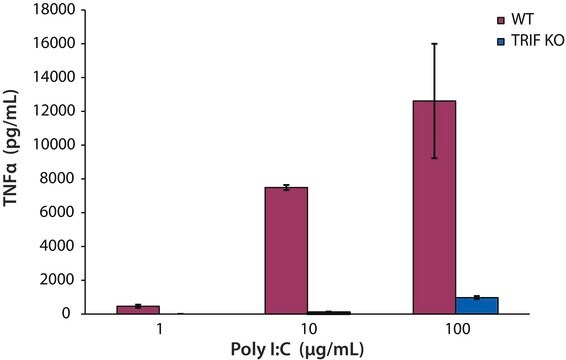L6143
Lipopolysaccharides from Salmonella enterica serotype typhimurium
suitable for cell culture, BioXtra, γ-irradiated
Synonyme(s) :
LPS
About This Item
Produits recommandés
Source biologique
Salmonella enterica (serotype typhimurium)
Niveau de qualité
Stérilité
γ-irradiated
Gamme de produits
BioXtra
Forme
lyophilized powder
Produit purifié par
gel-filtration chromatography
Technique(s)
cell culture | mammalian: suitable
Impuretés
<1% Protein (Lowry)
Température de stockage
2-8°C
Vous recherchez des produits similaires ? Visite Guide de comparaison des produits
Application
- in mice to elicit the secretion of pro-inflammatory cytokines
- to induce cytokine production in monocytes
- to elicit the activation of NF-κB pathway in mouse dendritic cells.
- to induce inflammatory response in human colon adenocarcinoma Caco-2 cells
- for stimulation of the catfish peripheral blood leukocytes (PBLs) to study estrogen receptor mRNA expression
Actions biochimiques/physiologiques
Reconstitution
Autres remarques
Produit(s) apparenté(s)
Mention d'avertissement
Warning
Mentions de danger
Conseils de prudence
Classification des risques
Acute Tox. 4 Dermal - Acute Tox. 4 Inhalation - Acute Tox. 4 Oral
Code de la classe de stockage
11 - Combustible Solids
Classe de danger pour l'eau (WGK)
WGK 3
Point d'éclair (°F)
Not applicable
Point d'éclair (°C)
Not applicable
Équipement de protection individuelle
Eyeshields, Gloves, type N95 (US)
Certificats d'analyse (COA)
Recherchez un Certificats d'analyse (COA) en saisissant le numéro de lot du produit. Les numéros de lot figurent sur l'étiquette du produit après les mots "Lot" ou "Batch".
Déjà en possession de ce produit ?
Retrouvez la documentation relative aux produits que vous avez récemment achetés dans la Bibliothèque de documents.
Les clients ont également consulté
Notre équipe de scientifiques dispose d'une expérience dans tous les secteurs de la recherche, notamment en sciences de la vie, science des matériaux, synthèse chimique, chromatographie, analyse et dans de nombreux autres domaines..
Contacter notre Service technique

